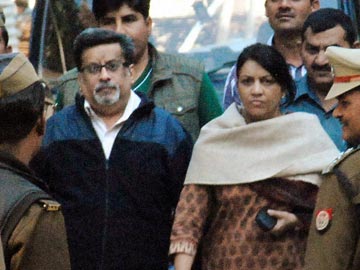
Ghaziabad, Nov 26: Dentist couple Rajesh and Nupur Talwar were today sentenced to life term by a CBI court after they were convicted of killing their daughter Aarushi and domestic help Hemraj five-and-a-half years ago.
49-year-old Rajesh and Nupur(48) were spared the death penalty by Additional Session Judge Shyam Lal who rejected the CBI plea for maximum punishment after the premier probe agency submitted that the case fell in the "rarest of rare" category.
Arguing before the court on quantum of punishment in the sensational double murder that had gripped the nation as one of the most puzzling crimes ever, CBI counsel R K Saini argued that the killing was a cold-blooded murder and fell in the "rarest of rare" category.
Defence counsel Tanvir Mir countered CBI's argument and said the evidence against his clients were weak and sought leniency for Talwars.
The arguments lasted just five minutes before the judge adjourned proceedings and pronounced he quantum of sentence at 4.30 PM. The Talwar couple remained composed.
The Talwar couple were also sentenced for five years for destruction of evidence and Rajesh for another one year for filing wrong FIR with police. All the sentences pronounced by the judge, who relied heavily on the circumstantial evidence provided by the CBI, will run concurrently.
The dentist couple were yesterday convicted in the murder of their 14-year-old daughter Aarushi and 45-year-old Hemraj in a case that was awash with allegations of sleaze and sex, police-goof-ups, CBI flip-flops and media bias. The judge also made
a reference to freaks in the history of mankind who kill their own progeny.
The couple was convicted under IPC sections 302(murder), 201(destruction of evidence) and 34(common intention to commit the crime). Rajesh was also convicted separately for "furnishing false information to the police regarding the murder of his daughter by Hemraj(Section 203).
According to the CBI, the dentist killed Aarushi and Hemraj at their Noida home on May 15-16 night, 2008, in a fit of rage after finding them in an objectionable position. It says Nuput helped in the crime.





Comments
Add new comment